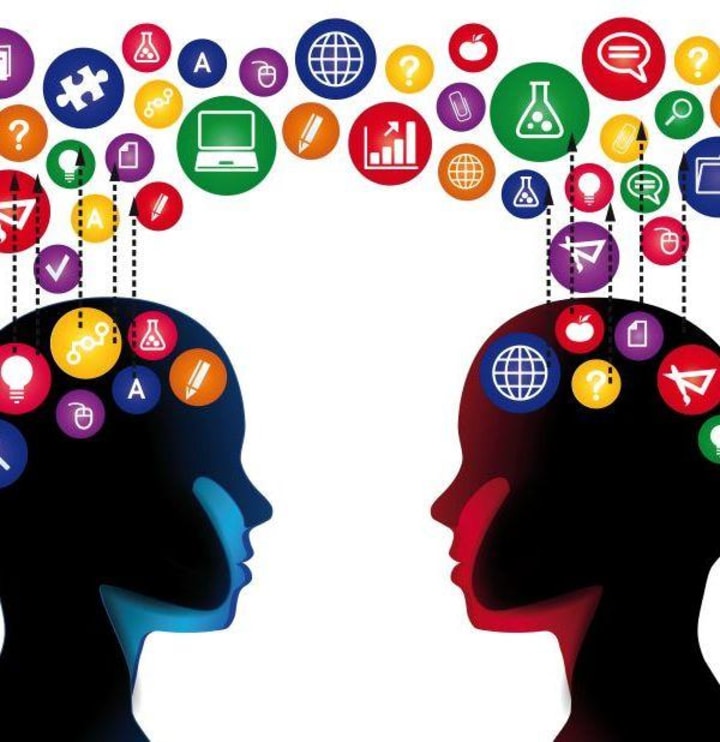When we think about the value of our work
Work, existence is justified?

We come to expect something from our work, hoping that our work will be meaningful and that we will achieve something, and once we find out that we can't, we become very emotionally depressed. But this begs the question: if work itself has no value, how does it provide value to anything else? After all, when people talk about work being "meaningless" and "good for no one," they are talking about value, and what value is that value?

What is the value of work?
American architect Buckminster Fuller once said, "We keep inventing all kinds of work out of the false notion that all of us must work because, according to Malthusian Darwinism, each of us must justify our existence."
With the wave of consumerism sweeping in, we no longer examine our existence in terms of our productive capacity but express ourselves through the objects we consume: the clothes we wear, the music we listen to, the teams we chase, etc.
Admittedly, to some extent, most of us prefer to define ourselves by what we do outside of work rather than by work itself. But for some reason, the paradox happens. When asked the question of the meaning of life, people often respond that it is their job that gives them the ultimate meaning of life, and that unemployment can be psychologically devastating.
Throughout the 20th century, people have been caught up in the "paradox of modern work," in which a person who loses the opportunity to work loses not only the material income that the work can bring but also the ability to define and respect oneself.
In the U.S., the stereotype of "the poor as idle, unmotivated and unworthy of a good life" has always existed because of racial discrimination: generations of immigrants in the U.S. have been taught the fictional conclusion that "the descendants of slaves lack discipline", and through this, they have established what Generations of immigrants in the United States have been taught the fictional conclusion that "the descendants of slaves lack discipline," and through this, they have established the concept of what constitutes a "hard-working American," just as Japanese workers were taught to despise Korean workers and English workers were taught to despise Irish workers. Many people agree with the basic logic of these contemporary moralists: that society is surrounded by "handlers" who take without giving; that the poor are poor because they lack willpower, have no self-control, and are lazy and unproductive; and that only those who work hard at jobs they don't want to do deserve the respect of others, and even better if their work is strictly regulated. It would be better if their work was strictly supervised.
Patience at work has become a badge of honor for "economic citizens". Patience has become as commonplace as a home address, and if you don't even have it, then you have no right to demand anything else.
Why are there so many meaningless jobs? The main reason is the uniqueness of the materialist feudal system that controls the rich economies (and is gradually taking control of the non-rich economies). Meaningless work causes suffering because the source of human happiness is a sense of having some impact on the world, and when referring to one's own work, people mostly equate this feeling with social value. But at the same time, they realize that the greater the social value of a job, the smaller the economic return it can bring to the worker. Workers in childcare, for example, have to choose between social value and economic reward: if you choose a social value, you can do useful and important work like childcare, but you are constantly told that the satisfaction of helping others is itself the reward for this effort and that you can figure out how to support yourself; if you choose the latter, a variety of living If you choose the latter, you have no problem with all kinds of living expenses, but you have to accept a meaningless and humiliating job that is physically and emotionally exhausting but does not bring any value, which is certainly in line with the universal value that "if you are not physically and emotionally exhausted by your job, then you are not living right, whether the job is meaningful or not". The impossibility of measuring absolute standards by value.
The impossibility of measuring absolute standards with values
When a person says that his work is meaningless or worthless, he must have some implicit value determination in mind: what kind of work is worth doing and what kind of work is not worth doing. However, it is notoriously difficult to determine whether each specific job is valuable, let alone to establish a reliable measurement system that can readily compare any two jobs to see which one is more valuable and useful to society.
Economists measure value according to a standard they call "utility. Utility" refers to the extent to which a good or service satisfies a need, and many people apply a similar concept to their work.
Am I providing something useful to society?
Sometimes the answer to this question is obvious. If you are building a bridge, for example, and someone has a need to cross the river and finds the bridge useful, then you will feel that your work is valuable. If you build a bridge that no one will use, like the famous "useless bridges" that many local politicians in the U.S. have initiated from time to time to get federal funding for their districts, then you will probably consider yourself to be engaged in meaningless work.
However, there is a problem with the concept of "utility". When we say something is "useful," we are only saying that it is an effective means of getting something else. If you buy a dress, then part of the "utility" of the dress is to keep you warm and not break the law by running around naked in public, but the main "utility" is whether the dress makes you look or feel pretty. So when we say that this dress has "utility" and that dress has no "utility", what is the basis?
Economists will say that it is a matter of taste and has nothing to do with the economic field.
But if you look deeper, you will find that any question of "utility" will eventually lead to such subjective judgments, even if it is a relatively less complex thing like building a bridge.
Yes, a bridge would make it easier for us to get to the other side, but why would we want to go to the other side? To visit our elders, to go bowling, or simply to buy groceries? We don't buy groceries just to maintain our health, but also about personal taste, ethnicity, family traditions, drinking party preparation, religious holiday event preparation, etc. When talking about these things, we can't simply use the phrase "basic needs".
So most economists feel that there is no point in commenting on what needs people should have, rather than just accepting what people have and talking about how effective ("reasonable") they are in trying to achieve their needs. On this, most workers seem to agree.
According to the prevailing view of contemporary economists, because the value is fundamentally a subjective judgment, it makes no sense to generate such feelings. Everyone should just put his or her opinions away and work on the assumption that if a good or service exists in the market, then it is valuable to some people, and that is all we need to know. As we have seen, to some extent most workers agree with economists on this point of view, at least when it comes to popular tastes and preferences, but when it comes to their work, their experience tends to deviate completely from the idea that "the market is always credible in these matters.
After all, there is a labor market.
If the market is always right, then the person who gets paid $40,000 to spend his days playing games on the computer and gossiping with old friends on social media would have to believe that he is providing a real service worth $40,000 to the company by playing games and gossiping. But that doesn't make sense. So the market isn't always right. Since the market can be wrong in the areas you know best, you can't take it for granted that you can assess the true value of a good or service in areas where you lack first-hand information, using the market as credible evidence.
Why do most people in contemporary society understand the social value in isolation from the economic value
What exactly does it take to improve people's lives? Let's go back to value theory.
In the field of economics, value theory has been used primarily as a means of explaining the price of goods: the price of bread fluctuates according to supply and demand, but this fluctuation is always around a central value, which is the natural price that bread should have. In the Middle Ages, this was seen as a moral issue: how do we give a "fair price" for a commodity? If a merchant raised the price of a commodity during the war, to what extent could it be considered as paying a reasonable "dangerous work allowance", and to what extent could it be considered as directly taking advantage of the fire? Legal scholars of the time drew on a popular example: a prisoner who lived on bread and water sold his wealth to another prisoner in exchange for a hard-boiled egg while serving his sentence. Is this a free choice? Will this contract still be valid when both parties are released from prison?
So, the understanding that the market can undervalue or overvalue things has been around for a long time and is still deeply rooted in people's consciousness, otherwise, we wouldn't be saying things like "got screwed" or "made a profit", although no one has succeeded in No reliable formula has ever been given to accurately calculate the "true" value of an item to say exactly how much people are "getting screwed" or "earning". There are simply too many factors involved, and many of them (personal taste or subcultural taste, i.e., emotional value) are not quantifiable.
When we talk about "values," we are talking about economic matters, i.e., matters that can be reduced to going to work for a paycheck or other money-making behavior.
When we talk about "values," however, the situation is quite different. Housework and childcare, for example, are naturally the most common types of unpaid work. Therefore, we always hear talk about the importance of "family values. Church activities, charity work, political volunteer work, and most artistic research, and scientific research are also unpaid. Even if a sculptor does end up super-rich and marries a porn star, or a sports advocate ends up a successful Rolls-Royce owner, most people will feel justified in their wealth and success only if it is an unintended consequence of artistic pursuits and athletic advocacy, at least if they cannot go directly to art or sports for money.
Money makes it possible to make precise quantitative comparisons.
With money, we can say that quantity A of pig iron, quantity B of juice drinks, and C of admission to a pedicure have equal value. This may seem natural, but when you think about it, there is a deeper meaning that cannot be ignored: the market value of a commodity is the extent to which it is comparable to another commodity (that is, tradable between commodities), and this comparability is precisely absent in the realm of "values".
Sometimes we may indeed say that artwork A is more beautiful than artwork B, or we may comment that a religious believer is more religious than another, but it would be very strange to put a precise multiplier on that beauty or piety. Imagine a comment like this: Monk A is five times more religiously devout than Monk B; this Rembrandt painting is twice as fascinating as that Monet painting. Not to mention the mathematical formula to calculate to what extent neglecting the family for the sake of art, or violating the law for the sake of social justice, can be considered justified and reasonable. Such an attempt at quantification is obviously absurd. Whether it is neglecting the family for the sake of art or violating the law for the sake of social justice, these things are not uncommon, but they are by their very nature impossible to quantify.
We might even say that it is precisely this inability to quantify that constitutes the value of "values. As with commodities, we can say that commodity A has economic "value" because it can be compared precisely with commodities B, C, D, etc., whereas the value of "values" is precise because of their incomparability. Each "value" is unique and incomparable, that is, priceless.
It seems to me that when people are confronted with complex issues, common sense often leads them to use words like "values" and "values" to express them briefly. Such expressions are not bad, but they are more about the ideals that people put into thinking about how things work than about how things work. After all, our lives are not divided into two, and cannot be simply divided into "economic" and "non-economic" spheres that do not permeate each other: in the "economic" sphere, everyone thinks only about money, only about material self-interest. In the "economic" sphere, everyone thinks only about money and material self-interest; in a range of other spheres (politics, religion, family, etc.), everyone suddenly does not care about money and self-interest. The true motivations are often mixed.
The survey found that for most people, "social value" is not just about wealth creation, o even leisure, but about socialization, about fitting in. Organ donation provides life-saving opportunities for each other, and the Glastonbury Rock Festival brings happiness and pleasure to people who stomp one the grass together while playing or listening to their favorite songs. The experience is collective and is seen as having "obvious social value. In contrast, helping the rich avoid each other (it is well known that almost all the rich do not like their neighbors) seems to have "no social value at all".
There is no way to measure such "social value" precisely. There is no doubt that people have different answers about what is useful and valuable to society, but I believe they would at least agree on two points: first, the most important thing that works brings to people is money to pay for various bills, and second, the opportunity to make a positive contribution to the world; second, the two are inversely proportional, i.e., the more your work is helpful to others, the higher the social value it brings, then the lower the reward this job brings you tends to be.
About the Creator
Wa Liao Ni
I saw how those years were running, and after winter, spring was ushered in.






Comments
There are no comments for this story
Be the first to respond and start the conversation.